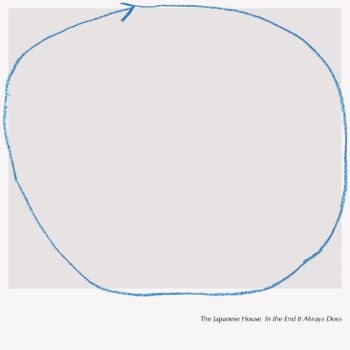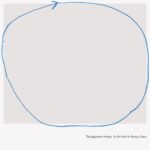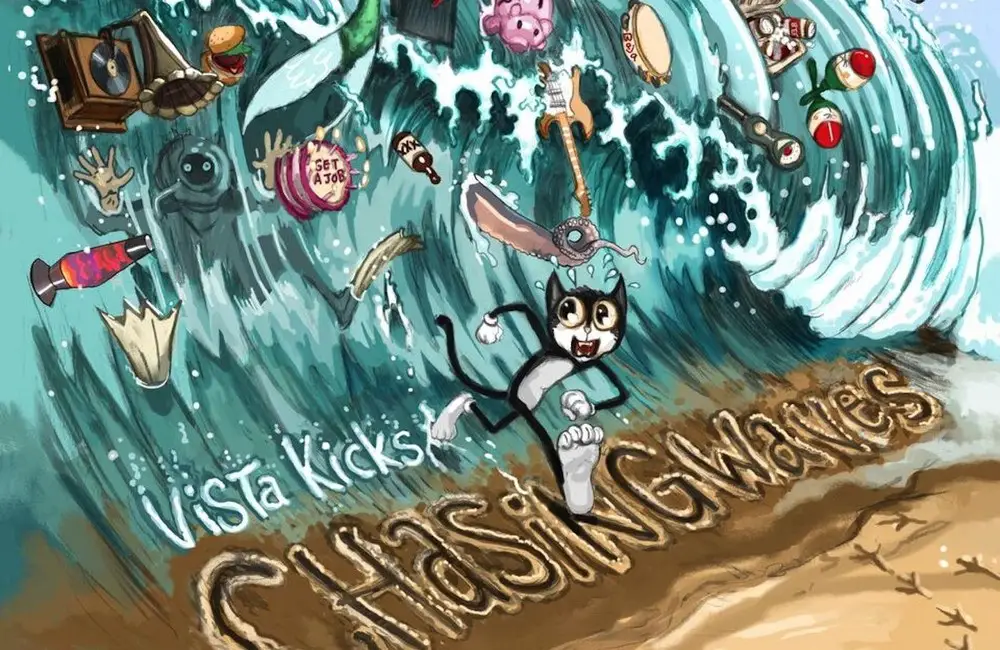Amber Bain discusses the merry-go-rounds of our lives and loves as chronicled on The Japanese House’s latest album, ‘In the End It Always Does.’
Stream: ‘In the End It Always Does’ – The Japanese House
(adsbygoogle = window.adsbygoogle || []).push({});
While you are feeling something, try to feel it for as long as you can. If the goal is to stop feeling the bad stuff, you’ll just become redundant.
Beyond her elusive name, there is not much mystery to The Japanese House.
Amber Bain is an open book, unafraid of mentioning ex-girlfriend’s names or threesomes or resentments. In both lending of electronic dance/pop with acoustic instrumentation and their writing of poetic lyrics that don’t beat around the bush, The Japanese House has an unexpected artistry. Bain is a magnificent contradiction, perfectly captured in her second album, In the End It Always Does (out June 30 via Dirty Hit). Bain calls on frequent collaborator George Daniel of The 1975 as well as new involvement from MUNA, Justin Vernon, and producer Chloe Kraemer.

Lyrics are beautifully poetic and pithy, and they maintain the fluid harmony and warmth of The Japanese House’s sound, though it all feels more solid, something you can sink your teeth into.
Bain shows us that she is at her strongest when she surrenders herself to a feeling, no matter what it may be. Second track, “Touching Yourself” is an irresistible dance bop about sexting that delves into cry for help.
(adsbygoogle = window.adsbygoogle || []).push({});
Bain shows just how fun yearning can be with a bouncy guitar and intoxicating bass line. The chorus explodes with a percussive guitar as her falsetto bursts open with desire. Bain pleads with their conscience, singing “Know I shouldn’t need it but I want affection/ Know I shouldn’t want it but I need attention.”
“Indexical Reminder of a Morning Well Spent” is the most stripped down track of the record, showcasing a sweet and simple melody with a tongue-twisting title. Bain chronicles a morning with her lover, perfectly content in the stillness of all that was. Bain remembers, “I bring myself around/ I leave my things around/ Look at this clip I found/ I watch it ’round and ’round and ’round.” The song plucks you out of thin air and into the story of two lovers over their morning coffee, completely oblivious to the world around them.
The story continues with the upbeat indie “Sunshine Baby.” Bain’s voice drips with honey, and the words melt together in a puddle of reverb as she sings, “I don’t know what’s right anymore/ I don’t wanna fight anymore.” Backing vocals and harmony from Matty Healy extends the heartfelt heaviness, cementing it as one of the record’s strongest tracks.
(adsbygoogle = window.adsbygoogle || []).push({});
The record ends with a song Bain wrote in “five minutes or less.” Featuring some of her best lyrics, “One for sorrow, two for Joni Jones” is where Bain masters the art of not taking herself too seriously: “Sometimes I think without you life would lose its bones, but really, day to day, I’ll still just be walking in the park with my little Joni Jones.” Bain’s hold on reality is as charming as it is crushing. With a sing-songy cadence that echoes that of Joni Mitchell’s, Bain traces the beginning and end of her little world, even as it is crumbling around her.
Bain knows that our cycles are as beautiful as they are inevitable. Bain introduces a new balance to The Japanese House with the record, expanding her artistry beyond the extremes. She captures moments with an impossible softness that settles in the pit of your stomach. Atwood Magazine discusses the merry-go-rounds of our lives and loves with Amber Bain.
It’s hard, because nothing about my writing is purposeful. It’s all instinctual. That’s why I can look back at something and say, “Wow that’s really good!”
— —
:: stream/purchase In the End It Always Does here ::
:: connect with The Japanese House here ::
(adsbygoogle = window.adsbygoogle || []).push({});
A CONVERSATION WITH THE JAPANESE HOUSE

Atwood Magazine: One of my favorite things about you is that your songs are gorgeously produced, the sounds literally sweep you off your feet. But, each song still manages to feel real, like the story is within reach and familiar. Would you call yourself a storyteller?
Amber Bain: I’ve realized that songwriting is basically about making people understand how you feel. It’s therapeutic for me. It’s a way for me to figure out how I feel, because sometimes I don’t really know. It’s news to me a lot of the time as well. I’ll write a song and be like, “Oh my God, do I genuinely believe that? Am I about to make some life choices?”
Is it easy for you to listen to that voice?
Bain: It’s like you’re a vessel to this idea. It’s just flying through the air and happens to go through you. It doesn’t really feel like I’m doing it. My favorite kind of songwriting is when you feel like you’re being hypnotized or using pure intention. “One for sorrow, two for Joni Jones” I wrote in five minutes or less, the same with “Morning Pages.” It did actually change my life. You can’t really write a song like “One for sorrow, two for Joni Jones” and stay in that relationship. [laughs]
(adsbygoogle = window.adsbygoogle || []).push({});
That does not sound like a together song (laughs).
When you describe old lovers, you are either moving towards them or away from them. They are the pages you have earmarked. Is this purposeful?
Bain: Yeah, I didn’t realize that. Most of the time I have really good relationships with my ex-girlfriends. It’s like documenting something. I think you can tell how deeply I care for the people I write songs about. I’ve never really done a hate song. “You Always Get What You Want” is a bit resentful. It’s hard, because nothing about my writing is purposeful. It’s all instinctual. That’s why I can look back at something and say, “Wow that’s really good!”
Compared to your previous project, this record is a bit more grounded. You describe your artistry as instinctual, so would you ascribe these changes to an identity shift?
Bain: Definitely. I am more in touch with myself. I know what I think and I know what I want. I’m good at apologizing. When you know yourself, there’s no hiding behind metaphors. I experimented more with metaphors in the past and it can be a way of avoiding what you want to say.
You write with a sensitivity and innocence when it comes to love. In “Friends” you make sure you’re speaking correctly and touching correctly. Where does this come from?
Bain: I think the album title ties into that. As a person I’m really positive. I’m happy exactly where I am. But when I was writing songs I was trying to change. I was always trying to analyze my behavior, always talking about change. But, I’m giving myself less of a hard time. I really wonder what my next album will be like, because this album is so much more positive than the last.
(adsbygoogle = window.adsbygoogle || []).push({});
I’ll write a song and be like, “Oh my God, do I genuinely believe that? Am I about to make some life choices?”
Whether it be about your identity as a gender non-conforming person or your sexuality, there are a lot of questions. Does this bother you at all?
Bain: I actually love it! It must be really annoying that I haven’t labeled myself. It’s not that I don’t care, I just don’t know. If I was born ten years later, it’d be completely different. I’m ok with whatever it is. I feel so masculine but also so feminine. My girlfriend now and my girlfriend before are both really beautiful in a classically beautiful way. That type of beauty is read as feminine, but they don’t necessarily feel quite feminine. Whereas I’m they/them’ed all the time. I’m really lucky that the way I look is how I feel.
I want to talk a bit about the title, “In the End it Always Does.” Just like you say, being human is going round and round. Are we all doomed to repeat our cycles? Is this the blessing or the curse of humanity?
Bain: I have regrets about writing these lyrics. [laughs] Right now, I’m in a really nice relationship and it’s bliss. I have always been holding back in a relationship, but now I feel equally matched. I’m scared I’ve cursed myself with the lyrics. I think you’re a different person every time you go around the cycle. Even if not a break-up, relationships have their cycles. That’s the beauty of it! The other part of this album is embracing pain, and realizing that you won’t feel it for long. While you are feeling something, try to feel it for as long as you can. If the goal is to stop feeling the bad stuff, you’ll just become redundant. It’s a great way of gauging who you are.
— —
:: stream/purchase In the End It Always Does here ::
:: connect with The Japanese House here ::
(adsbygoogle = window.adsbygoogle || []).push({});
— — — —

Connect to The Japanese House on
Facebook, Twitter, Instagram
Discover new music on Atwood Magazine
© Jay Seba
(adsbygoogle = window.adsbygoogle || []).push({});
:: Stream The Japanese House ::
(adsbygoogle = window.adsbygoogle || []).push({});
(adsbygoogle = window.adsbygoogle || []).push({});


 © Jay Seba
© Jay Seba





